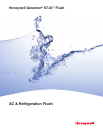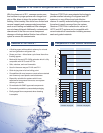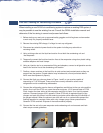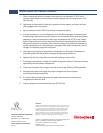
Disclaimer
All statements, information anddata given herein are believed to be
accurate and reliable but are presented without guaranty, warranty
or responsibility of any kind,expressed or implied. Statementsor
suggestions concerning possible use of our products are made
without representation or warrantythat any such use isfree of
patent infringement and are not recommendations to infringe any
patent. The user should not assumethat all safety measures are
indicated, or that other measures may notbe required.
Honeywell Genetron Refrigerants
101 Columbia Road
Morristown, NJ 07962-1053
Phone:1-800-631-8138
www.honeywell.com/genetron
Genetron is a registered trademark of Honeywell International Inc.
ST-20 is a trademark of Honeywell International Inc.
RX11-Flush is a trademark of Nu-Calgon.
Printed in U.S.A.
© 2009 Honeywell International Inc. All rights reserved.
G525-200
System Repair and Cleanup Procedure
1. After a mechanical failure or hermetic motor burnout, use Genetron ST-20 Flush to
remove contaminants by flushing interconnecting piping as per the directions for Line
Set Cleaning.
2. Remember to disconnect all electrical connections to the system and obtain and use
safety goggles and nitrile gloves.
4. Do not attempt to push ST-20 Flush through compressor bodies.
3. It will be necessary to cut the refrigeration or air conditioning system at several points
to isolate large components such as receivers and condensers which must be cleaned
separately. It may be impractical to clean large components with ST-20 Flush. Inspect
these components and consider mechanical cleaning if large deposits are discovered.
Remove any solenoid or reversing valves from the piping. It may become necessary to
modify procedures for line set cleaning to completely flush these components, use dry
nitrogen to completely purge the component.
5. After cleaning and purging, assemble the refrigeration or AC system. Remember to
purge the system with low pressure nitrogen during brazing operations.
6. Replace the liquid line filter drier and consider installing a suction filter.
7. If the original compressor is being re-installed, change the lubricant. Use only lubricants
specified by the compressor manufacturer.
8. Pressurize the system with nitrogen and leak check as per AHRI and EPA guidelines.
9. Evacuate the system and charge the proper refrigerant as per the system
manufacturer’s recommendations.
10. If a retrofit was accomplished during this repair, label the system indicating the
refrigerant and lubricant used.
11. Properly dispose of contaminated Genetron ST-20 Flush.






